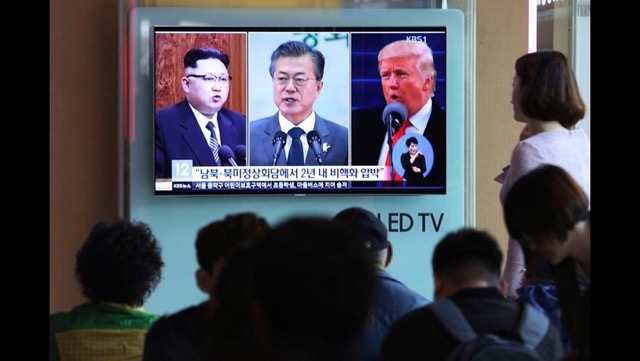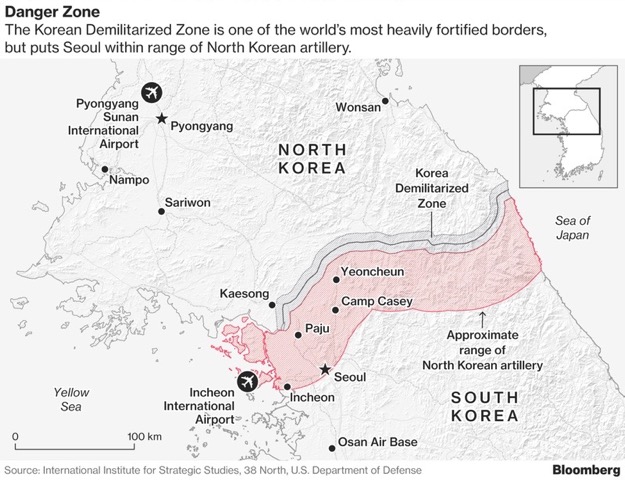Is The Korean War Finally Ending?

For those who served on the Korean peninsula from 1950-1953 and survived, men now in their eighties and nineties, the fighting ended when they came home. For those who died in the streets, fields, landing zones, and mountains of Korea, the fighting ended when their young lives were snuffed out by a North Korean or Chinese soldier. And for millions of displaced and traumatized civilians, the fighting ended when the guns went silent on July 27, 1953. For all of them, the fighting was over but the war wasn't.
As we know all too well, wars don’t end just because people temporarily stop killing one another. Case in point: Korea.
With pundits and politicians now saying that the upcoming inter-Korean summit could lead to a peace treaty officially ending the Korean War, millions around the world are watching and waiting. What exactly does it all mean? Is it really going to happen? And what will be the final outcome? Unfortunately, no one knows.
As an expat living in Seoul and a writer who focuses on the Korean War, I’m trying to understand how all this might play out. I’ve spent the last three years in Korea interviewing veterans and former refugees and talking with Korean friends, journalists, and experts about the war. I’d like to think I have a good grasp of what might or might not happen. But I don’t.
Six months ago no one would have predicted the breaking news stories coming out of Seoul and Washington today. We’re living in a truly historic moment. Regardless of what’s decided at the upcoming summits, the next few months will shape history. One way or another.

South Koreans watching the news yesterday in Seoul. (Photo credit: AP)
In a Nutshell
Here's what we can expect:
- (The best-case scenario) Countries that signed the 1953 armistice, the US, North Korea, and China, agree to conditions set forth in the inter-Korean and US-NK talks and bring an official end to the war. With South Korea enthusiastically on board, what the entire world (I’m making a big assumption here) has been waiting for since 1950, peace on the Korean peninsula, is finally realized. The DMZ, a 160-mile long heavily militarized “border” between the North and South slowly disappears, and decades of tension, border skirmishes, kidnappings, and threats stop.
2. (Not ideal but a step in the right direction) The talks result in one party, possibly all, leaving unhappy. What one country considers an unacceptable condition - the removal of all US troops from Korea, denuclearization of the peninsula, an unrealistic time frame for accomplishing the peace process, or a lifting of North Korea sanctions - prevents the signing of a treaty. If this happens, as long as all parties are willing to negotiate and compromise, there’s still a proverbial light at the end of the tunnel. Something good could develop.
3. (Back to square one) Nothing happens. The talks falter and we’re right back where we started. Unfortunately, no one knows if Kim Jong-un really wants to denuclearize and really wants to cooperate with the US and his neighbor to the South. Conversely, no one knows if President Trump is willing to see this through to the end. The process could take time. And whose side is time on? Is Kim just playing the "delay game," hoping to outlast his American opponent, or will talks and the Hermit Kingdom's increased contact with the outside world ultimately bring about internal change? There are obviously lots of wild cards, and no one can predict what will come next.
4. (Worst-case scenario) As Korean expert Victor Cha recently said, if everything fails, “the only thing after a summit is a cliff.” If a renewed war of words erupts and another nuclear missile test takes place, all bets are off. It’s no secret that Trump has warned North Korea this is their last chance.
The following weeks and months will be critical.
Top picture: Photo credit: British Pathe.






It is my sincere hope and prayer that option 1 will come to fruition. Looking at the participants from our side I am not certain we have the correct negotiators involved. After all these years this would be a fitting tribute to all the friends and acquaintances I have missed for many years.
We’re all hoping for option 1, but regardless of what happens, the sacrifices you and your friends made in the Korean War have already been recognized. Just look at South Korea today.
Thanks for reading and commenting, Travis. We always appreciate getting your feedback.